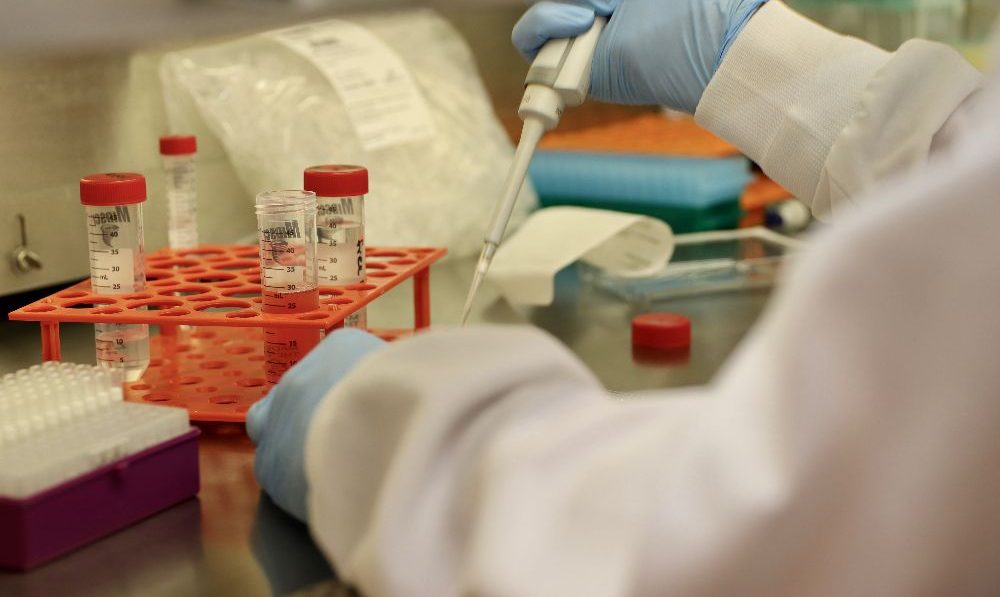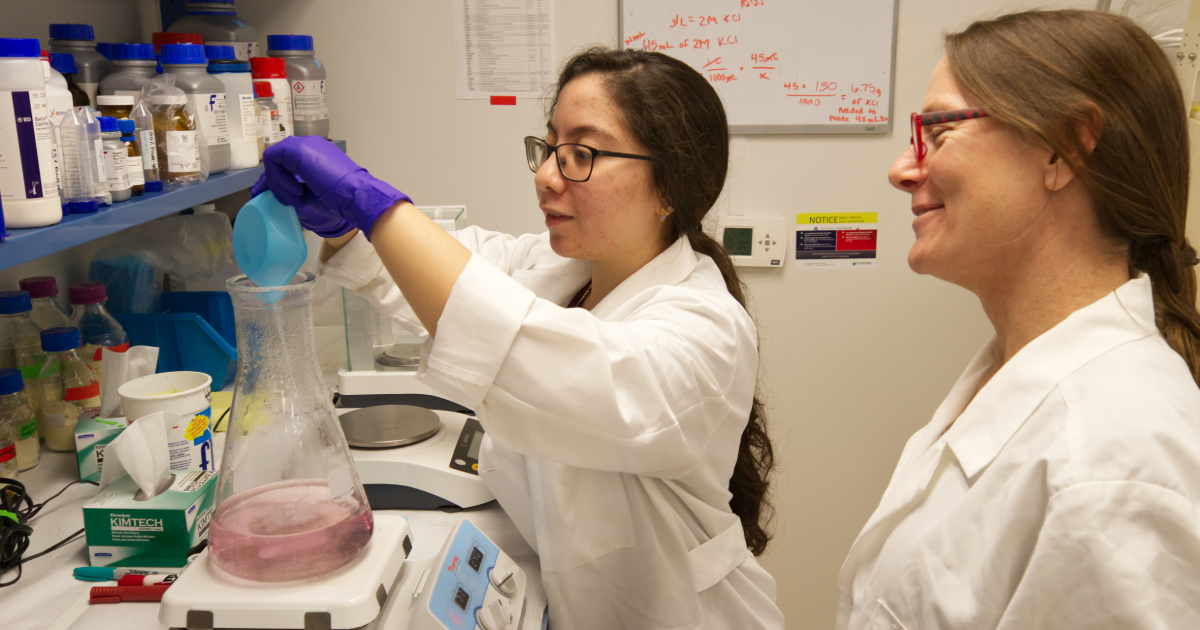
Animal and Food Sciences Master's Degrees

Non-thesis M.S. in Animal Science or Food Science
For both working professionals and recent college graduates looking to obtain admission into veterinary, medical or thesis-requiring programs, our program provides students with additional educational experience in animal and food sciences.
Veterinary Biosciences, Biotechnology, and One Health (VBBOH)
Our program is provides hands-on technical training as well as extensive theoretical training in host-pathogen, -nutrition and -metabolic interactions. This concentration is designed for individuals who are not immediately competitive for direct matriculation into professional programs, industrial research positions or graduate school, this two-year, non-thesis master’s degree. We broadly define One Health as the interactions of hosts, pathogens, their nutrition and their environment. Students will:
- Expand their knowledge and skills in fundamental host-pathogen interactions, nutrition, and immunology;
- Acquire hands-on technical training in cell and molecular biology techniques as they relate to basic research, diagnostic, and clinical applications; and
- Acquire training in experimental design and data analysis.
Business and Entrepreneurial Leadership
This concentration provides graduate students with tools and skills for pursuing a science-related career in industry, government, service, non-profit, Cooperative Extension or other fields related to the animal and/or food sciences. Professionals seeking additional training can use this concentration to enhance their core competencies in an ever rapidly evolving job market. Students will:
- Expand knowledge and skills in the animal and food sciences;
- Acquire knowledge and skills in areas of leadership, organization, project management, organizations and entrepreneurship; and
- Apply knowledge through design and completion of a problem-solving project.
Non-Thesis MS in Animal Science: Business and Entrepreneurial Leadership Concentration; Non-Thesis MS in Food Science, Business and Entrepreneurial Leadership Concentration; Non-Thesis MS in Animal Science, Veterinary Biosciences, Biotechnology and One Health Concentration
Undergraduate GPA of 3.0 is preferred
Letters of recommendation
Graduate application essay
For international applicants from countries where English is not the primary language, demonstration of English proficiency is required by TOEFL or IELTS that meets the minimum requirements set forth by the University of Delaware (https://www.udel.edu/academics/colleges/grad/prospective-students/grad-admissions/test-scores/)
Admission to the Non-Thesis MS degree programs is based on selections made by the department Graduate Advisory Committee in compliance with University policies and procedures. Admission is selective and competitive and based on the number of well-qualified applicants, the number of available faculty to serve as mentors, and facilities. Those who meet stated minimum academic requirements are not guaranteed admission, nor are those who fail to meet those requirements necessarily precluded from admission, if they offer other appropriate strengths and/or experience.
Applications will be taken on a continuing basis to allow for admittance in either the Fall, Spring, or Summer Semesters. The deadlines for each semester are given below. Note: International applicant deadlines precede domestic, U.S. citizen applicants, due to additional timing requirements for obtaining an appropriate student VISA.
VBBOH concentration
Fall:
- June 1 (international applicants)
- August 1 (domestic applicants, U.S. citizens)
Spring:
- December 15 (international applicants)
- January 15 (domestic applicants, U.S. citizens)
Summer:
- April 1 (international applicants)
- May 1 (domestic applicants, U.S. citizens)
Business and Entrepreneurial Leadership concentration
Fall:
- June 1 (international applicants)
- August 1 (domestic applicants, U.S. citizens)
Spring: December 1
Summer:
- April 1 (international applicants)
- May 1 (domestic applicants, U.S. citizens)
Admission to the graduate program is competitive. Those who meet stated requirements are not guaranteed admission, nor are those who fail to meet all of those requirements necessarily precluded from admission if they offer other appropriate strengths.
Regular admission
Regular status is offered to students who meet all of the established entrance requirements.
Conditional admission
Successful applicants are typically admitted conditionally because stated information is self‐reported and uploaded documents are unofficial. Fulfilling the conditions stated on an offer of conditional admission by the first date of graduate coursework is critical, so the instructions stated on the letter must be followed carefully. Failure to clear all stated conditions by the start of graduate coursework may result in revocation of admission to the graduate program.
Non-Thesis M.S. Degree in Animal Science: Business And Entrepreneurial Leadership Concentration
Non-Thesis M.S. Degree in Food Science: Business And Entrepreneurial Leadership Concentration
Non-Thesis M.S. Degree in Animal Science: Veterinary Biosciences, Biotechnology and One Health (VBBOH) Concentration
A research topic shall be determined in conference between the faculty advisor and the student. The student will prepare a research proposal containing pertinent background material including a literature review, specific objectives of the research project and methods to be used in the planned studies. The proposal shall be submitted to the student’s Graduate Committee for review and approval of the research project. A proposal review meeting shall be held prior to the completion of the first year following matriculation. The proposal shall be submitted to the committee members at least ten working days prior to the scheduled meeting. The student will give an oral presentation summarizing the proposal. The committee members will question the student to verify that the student understands the research problem and the experimental approaches needed to address it. The Committee will also ensure that the student has the proper training and resources to do the research. As a result of the proposal review meeting, the student may be required to revise the proposal and/or take additional relevant course work.
The student meets with their advisor to plan their course of study and schedule their research experience in the program. Advice is given concerning course selection based on interests and undergraduate/graduate background. Our program's size allows for individualized attention to each graduate student.
With approval of the department chair who renders a decision after consultation with the Graduate Committee and relevant faculty, and if necessary, in consultation with the department that offers the (potentially) equivalent course, up to nine cresits for the VBBOH concentration and six credits for the Business concentration may be recommended to the Office of Graduate and Professional Education to be transferred to apply to the degree provided that the credits have not been applied to obtain a different degree.

